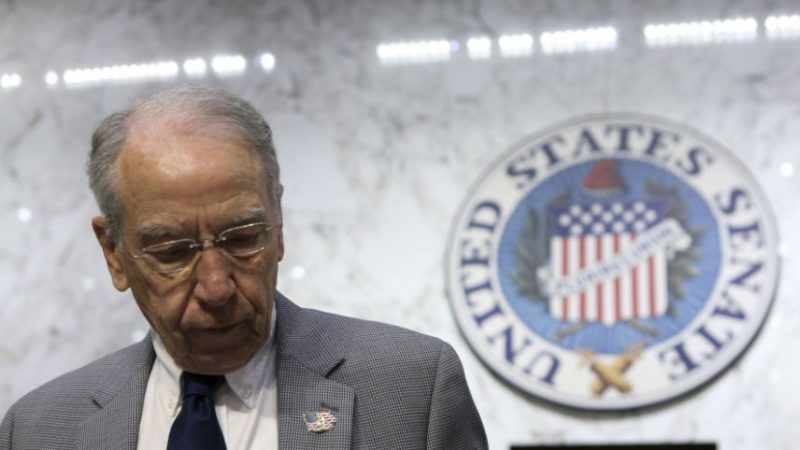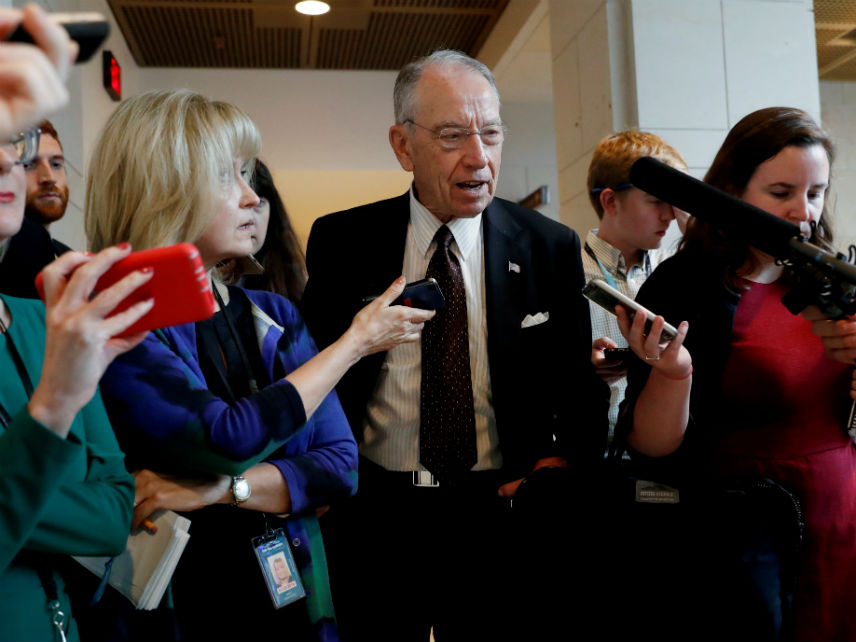The Return of Criminal Justice Reform
Congress failed to pass a bill reforming mandatory minimums last year; now two senators want to try again.


Two senators announced today that they will reintroduce a bipartisan bill to overhaul federal sentencing guidelines. The legislation failed to pass Congress last year, much to the disappointment of criminal justice reform groups.
The Sentencing Reform and Corrections Act, originally introduced by Sens. Chuck Grassley (R-Ia.) and Dick Durbin (D-Il.) in 2015, would reduce the mandatory-minimum sentencing guidelines for repeat drug offenders without serious violent felonies and would broaden the "safety valve" exception to federal mandatory minimum sentences. It would also add new mandatory minimum sentences for interstate domestic abuse and for providing support for terrorists, while strengthening penalties for certain other crimes.
Grassley and Durbin say they will reintroduce the bill this year, although they did not say when.
"While the political landscape in Washington has changed, the same problems presented by the current sentencing regime remain," Grassley said in a statement, "and we will continue to work with colleagues in Congress and the administration, as well as advocates and members of the law enforcement community, to find a comprehensive solution to ensure justice for both the victims and the accused, and support law enforcement in their mission to keep our communities safe."
The legislation was hammered out in 2015 and then revised again in 2016 as part of a compromise between skeptical Republicans, like the traditionally law-and-order Grassley, and a bipartisan group of Democrats and Republicans who support reducing or eliminating mandatory minimum sentencing guidelines.
Criminal justice reform advocates saw the bill as their best chance in years to get a major piece of legislation through Congress, but despite passing the Republican-controlled Senate Judiciary Committee the bill never made it to the Senate floor for a vote.
Senate Majority Leader Mitch McConnell (R-Ky.), facing opposition to the bill from within his caucus, said he was waiting on the House to pass a package of similar legislation first. Speaker of the House Paul Ryan (R-Wisc.) said he was committed to bringing that package to the floor—but in the midst of a bitter election year, as well as disputes with Democrats over some provisions in the House bill, neither chamber of Congress found the will or time to bring the legislation to a full vote.
Reformers' disappointment was compounded when President Donald Trump tapped Jeff Sessions to be attorney general. As a senator, Sessions was one of a small but vocal group of Republicans who staunchly support mandatory minimum sentencing and 1980s-style law enforcement.
Yet Jared Kushner, Trump's son-in-law and all-around White House point man, has been meeting privately with senators, including Durbin and Grassley, to discuss criminal justice reform. The subject is reportedly one of Kushner's areas of personal interest—his father was sentenced to two years in federal prison for tax evasion—and last week he hosted a bipartisan meeting on improving job training and re-entry programs for federal inmates. Kushner's support could provide valuable political cover for Republicans.
"This legislation is the product of more than five years of work on criminal justice reform," Durbin said in a statement. "It's also the best chance in a generation to right the wrongs of a badly broken system. The United States incarcerates more of its citizens than any other country on earth. Mandatory minimum sentences were once seen as a strong deterrent. In reality they have too often been unfair, fiscally irresponsible and a threat to public safety."


Show Comments (11)